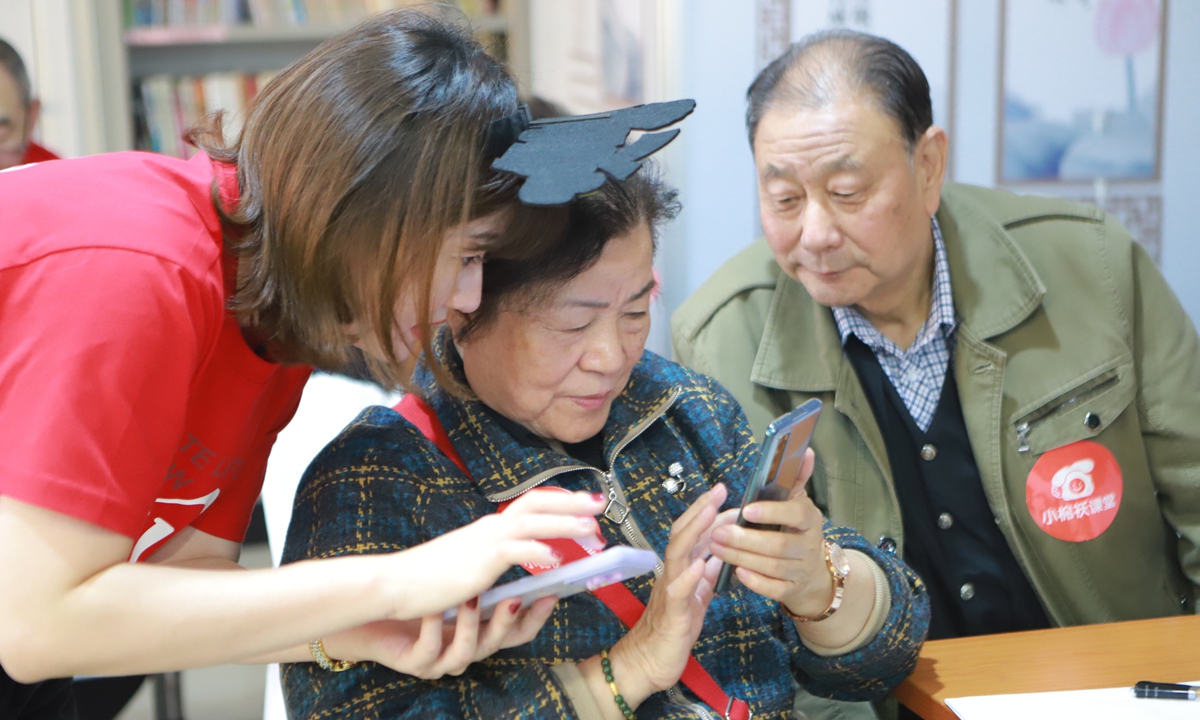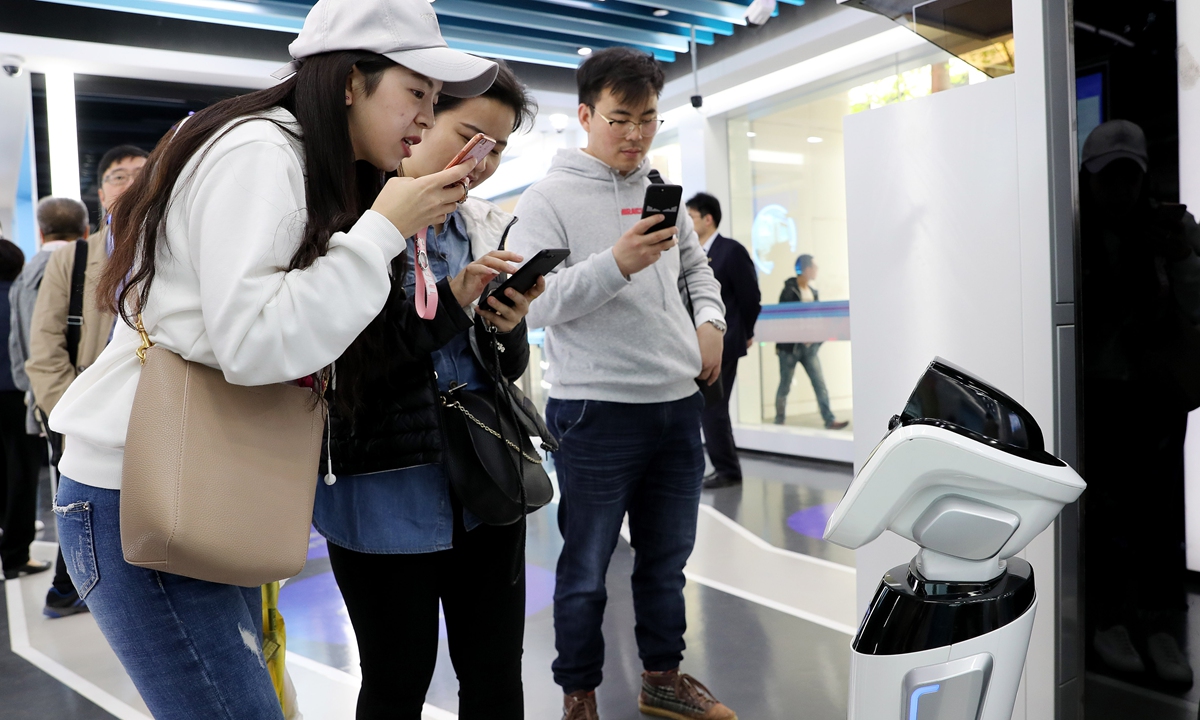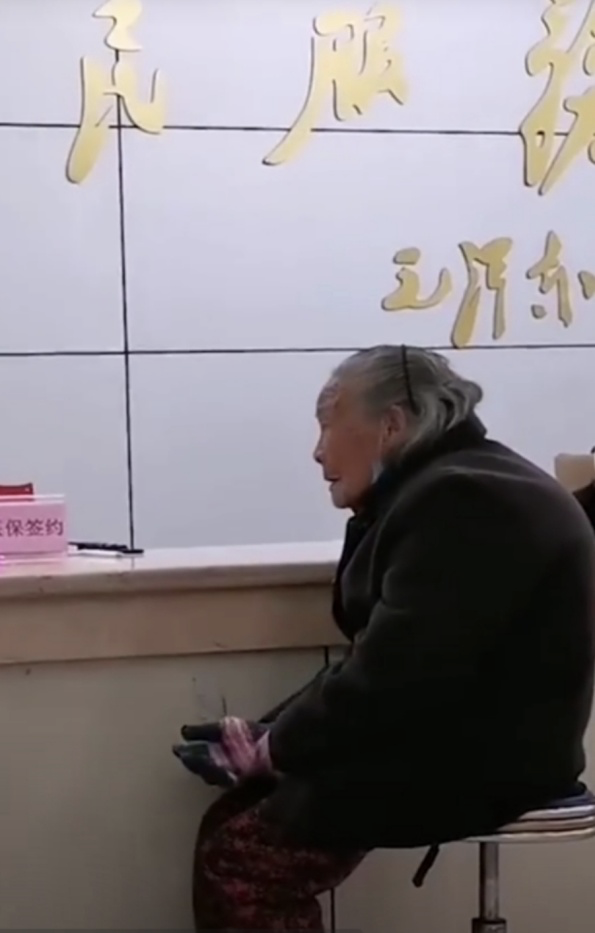Narrowing 'digital divide': China steps up efforts to better serve the elderly in digital age
By Huang Lanlan, Li Qiao and Lu Yameng Source: Global Times Published: 2020/12/2 19:33:40

Volunteers in Beijing teach elderly people how to use smartphones. Photo: Xinhua
A video of a 94-year-old grandma being carried to a bank for face recognition to activate her social security card in Guangshui, Central China's Hubei Province, has sparked heated debate on the internet, once again drawing attention to the difficulties elderly people face in using smart technology.
Various smart technologies emerging in the digital era have brought major convenience to many people's daily lives, but have also excluded the elderly from the modern world to a certain extent. The latest incident reflects the "technological intelligence dilemma" affecting millions of elderly people in China.
Tech dilemma
Chinese laws define those aged 60 or above as elderly. There were 253.88 million elderly people in the Chinese mainland by 2019, 18.1 percent of the country's overall population that year, according to data from the National Bureau of Statistics (NBS).
"This huge group hasn't well adapted to the development of today's technology dominated society," He Wenjiong, a professor of School of Public Affairs and Vice President of the China Association of Social Security (CAOSS), told the Global Times. "This is a problem that needs early resolution."
According to the 46th China Statistical Report on Internet Development, the number of netizens in China reached 940 million by June 2020, with an internet penetration rate of 67 percent. But only 10.3 percent of the netizens are aged 60 or above.
"I would like to learn how to use the smart devices for convenient life. However, presbyopia and slow reaction prevented me from catching up with the progress of science and technology," Li Ying, a 71-year-old woman living in Rushan, East China's Shandong Province, told the Global Times on Tuesday.
Li left her reading glasses at home when she traveled to Shenzhen in November. She complained that the words and button on a navigation app are too small for her to read.
"I wanted to click on the Shenzhen Museum, but my hand was on the road next to it. For our elderly people, we can't see clearly and our hands can't handle it well. I think I might as well walk and ask for directions," she said.
Li refused to tie her bank card to a mobile payment app as she worried about losing money from an improper transaction or cyber fraud. Her husband clicked a button by mistake and paid some money during the interview, complaining to Li "I am just browsing and I don't know what I clicked that led to the payment."
"The young people know how to contact the client service of the app and bank to get back the money, but it is a big burden for the old to deal with it. So I dare not use the mobile payment," Li noted.

Residents try an unmanned bank in Shanghai in April 2018. Photo: Xinhua
Her son bought train tickets for her to Shenzhen and handled all online payment for her.
Intelligent development is a double-edged sword for dealing with an aging society, said Peng Xizhe, director of Fudan University Center for Population and Development Policy Studies.
"On one hand, digitalization has brought a lot of opportunities for China to cope with the aging population and to some extent made up for the shortage of labor force; on the other hand, while many old people can surf the internet, others are still struggling to keep up with the technological development trends," Peng told the Global Times Tuesday.
Bridging digital divide
China has been aging rapidly in the past 20 years. There were 176.03 million people aged 65 or above by the end of 2019, accounting for 12.6 percent of the whole population of the Chinese mainland that year, according to NBS statistics. The percentage was 6.96 percent in 2000.
A country or region where the share of population aged 65 or above reaches 7 percent can be considered an aging society, according to United Nations standard.
Senior Chinese citizens face an increasingly evident problem of a "digital divide," encountering many inconveniences in daily life from not using the internet or a smartphone, read the Implementation Plan on Effectively Solving the Difficulties of the Elderly Using Smart Technology issued by the General Office of the State Council in November.
Highlights of the plan include optimizing the health screening procedure at public places like railway stations amid the COVID-19 epidemic, allowing the elderly without smartphones or who don't know how to use a health QR code to enter with their identity card or other related documents.
All localities and departments shouldn't regard a health code as the only "access credential" for citizens to enter public places, the plan notes.

A screenshot of a video of an elderly woman not being allowed to pay in cash for her health insurance and sitting helplessly at a service counter. Photo: Weibo
Under the plan, elderly Chinese people will enjoy easier-to-use digital services or alternative traditional ones in all aspects of life, from seeing a doctor to booking a Peking Opera ticket.
Experts welcomed the move as a good response to the sporadic media coverage of elderly people without health codes being rejected by public transportation during the epidemic. A bus driver in Northeast China's Heilongjiang Province caused public anger for kicking off a senior citizen who had no smartphone to scan the health code, China National Radio reported in August.
Aside from the COVID-19 health screening, the plan mandates retaining traditional way of services for the elderly in seven main fields including transportation, medical services, cultural and sport activities, consumption and payment. It bans the discriminative practice of rejecting cash.
Meanwhile, the plan promises to train the elderly in the use of some technologies, and to build big-character or audio versions of websites and mobiles applications that cater to this group.
The plan is practical and humanized, showing authorities' respect and care for the elderly, said Xi Heng, a professor at the School of Public Management of Northwest University in Xi'an, Northwest China's Shaanxi Province.
Smart technology is good and reflects social development and optimal allocation of resources, Xi said. "Rather than simply 'protecting' the elderly from digital services, the plan offers them multiple choices - meaning they are free to either embrace new technology or keep traditional ways," he told the Global Times.
The government's next step is to take effective measures to ensure the plan is put in place nationwide, Lu Xiangdong, an official with the State Council, said at a press conference on November 26. "[We will] let senior citizens enjoy a deeper sense of gain, happiness and security in the development of information technology," Lu added.
Local solutions
To better address the difficulties and needs of its aging population, China is both simplifying smart technologies and retaining traditional service procedures for them, stepping up efforts to build a more senior-friendly society as emphasized in the 14th Five-Year Plan (2021-25) for National Economic and Social Development.
Coping with an aging population has become an urgent issue for China to take its large population base into account, Peng said. "Fortunately, China's aging society is also in the era of rapid development of science and technology, which brings China advantages to cope with and solve the aging problem," he said.
In many cities across the country, enterprises and public service agencies are catering to the needs of senior citizens with various methods. In Shanghai, the official taxi-hailing app Shencheng Chuxing launched a senior-oriented function in September, enabling users to hail a taxi by simply pushing an icon in the app, rather than typing in their locations and destinations.

An elderly tourist takes a photo of the Great Hall of the People in Beijing on Wednesday. The third session of the 13th National Committee of the Chinese People's Political Consultative Conference closed there in the afternoon. Photo: cnsphoto
"This particular icon keeps flickering, highly visible to elder users," Shencheng Chuxing's general manager Yuan Dongliang told the Global Times. The service has been available on 85 percent of the city's taxies, Yuan added.
In Beijing and Shanghai, several hospitals reached by the Global Times on Tuesday said they retain traditional registration and payment methods for senior citizens.
"For the elderly patients who do not know how to pay on their phones, we have a manual service window. Both cash or a bank card can be used to pay," a volunteer at the hall of Civil Aviation General Hospital in Beijing told the Global Times.
The hospital encourages patients to register an appointment via its WeChat platform. It nonetheless provides elderly people who don't use WeChat with a phone appointment service, said an employee at the hospital's reception desk.
In smaller cities like Wuxi, East China's Jiangsu Province, railway stations reportedly received public praises for setting green channels during the COVID-19 epidemic for elderly passengers with neither smartphones nor health codes.
"Respecting the old has always been a fine tradition of the Chinese nation," Peng said. China has the cultural foundation to support the whole society to actively respond to the aging problem, he noted.
RELATED ARTICLES: